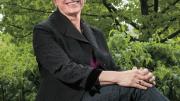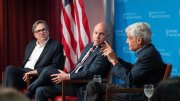When Naomi Oreskes wrote an article in 2004 summarizing the scientific consensus on climate change, she recalls, “I was treated as if I had thrown some kind of grenade.” Public discourse at the time treated global warming as an active scientific debate, but the history of science professor, who arrived from the University of California, San Diego, last fall, had assumed journalists were simply confused about the evidence. As she began examining her critics’ connections, though, Oreskes uncovered a very different story, and in Merchants of Doubt (2010), she and her coauthor, Eric M. Conway, described how deliberate, industry-funded misinformation campaigns had serially misled the media and obscured the scientific consensus on the harmful effects of smoking, acid rain, and the ozone hole—and now, climate change. Her research has also taught Oreskes the need for academics to “speak clearly and crisply” on issues of social and political importance; recently, she signed an open faculty letter calling for Harvard’s divestment from fossil fuels. Her new book with Conway, The Collapse of Western Civilization (Columbia), to be released in July, imagines a future with climate change run rampant. The ability to “range broadly,” she says, is the appeal of history of science. Trained as a mining geologist at Imperial College London, Oreskes began exploring the history of her discipline as a graduate student at Stanford. She published in both fields until, she quips, she had children: “I couldn’t have three careers.” With her hydrologist husband and their two grown daughters, she spends her free time outdoors, hiking, camping, and occasionally climbing: “I still like to be on rocks.”
Harvard historian of science Naomi Oreskes takes on climate-change skeptics
Harvard historian of science Naomi Oreskes takes on climate-change skeptics
Harvard historian of science Naomi Oreskes takes on climate-change skeptics.

You might also like
Former Homeland Security Chief Says ICE and CBP Have “Lost Their Way”
At Kennedy School talk, Jeh Johnson advocates restructuring “outdated” DHS.
Open Book: A New Nuclear Age
Harvard historian Serhii Plokhy’s latest book looks at the rising danger of a new arms race.
Harvard Symposium Tackles 400 Years of Homelessness in America
Professors explore the history of homelessness in the U.S., from colonial poor laws to today’s housing crisis
Most popular
Explore More From Current Issue

Getting to Mars (for Real)
Humans have been dreaming of living on the Red Planet for decades. Harvard researchers are on the case.

A Near-Perfect Football Season Ends in Disappointment
A loss to Villanova derails Harvard in the playoffs.






